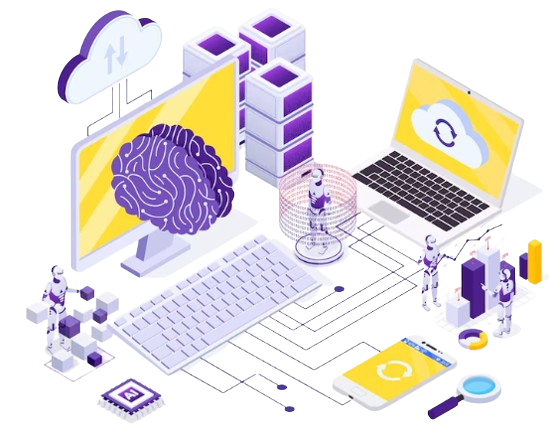AI Ethics is not just a theoretical concept but a practical necessity in the development and deployment of AI technologies. By addressing the ethical challenges of bias, privacy, accountability, and societal impact, we can harness the potential of AI while ensuring that it benefits everyone.
As technology advances at an unprecedented rate, the integration of big data and artificial intelligence (AI) into various sectors of society has become a game-changer. From healthcare to finance, entertainment education, these technologies offer transformative potential. However, with great power comes great responsibility, and the ethical implications of big data and AI cannot be ignored. This blog post delves into the critical importance of AI Ethics and the challenges we face in ensuring ethical standards are maintaing in this rapidly evolving field.
Understanding AI Ethics
AI Ethics refers to the principles and guidelines that govern the development, deployment, and use of AI technologies. It encompasses issues related to fairness, transparency, accountability, and the overall impact on society. As AI systems become more sophisticated, they can make decisions that significantly affect people’s lives, raising ethical questions about bias, privacy, and the potential for misuse.
Incorporating AI Ethics into the design and implementation of AI systems is crucial for ensuring that these technologies. They are using responsibly and do not cause harm. It involves a multidisciplinary approach, bringing together experts from technology, law, philosophy, and social sciences to address the complex ethical challenges that arise.

The Ethical Challenges of Big Data and AI
-
Bias and Fairness
One of the most pressing ethical challenges in AI is the issue of bias. AI systems have trained on large datasets, which can contain historical biases and prejudices. If not carefully managed, these biases can be perpetuated and even amplified by AI algorithms, leading to unfair outcomes.
Ensuring fairness in AI requires rigorous testing and validation of algorithms, as well as diverse and representative datasets. Developers must be vigilant in identifying and mitigating biases to create systems that are equitable and just.
-
Privacy Concerns
Big data involves the collection and analysis of vast amounts of personal information. While this data can provide valuable insights and drive innovation, it also raises significant privacy concerns. The potential for misuse of personal data, unauthorized access, and data breaches poses serious ethical dilemmas.
Implementing robust data protection measures, obtaining informed consent, and ensuring transparency in data collection and usage are essential steps in addressing privacy concerns. AI Ethics must prioritize the protection of individuals’ privacy and ensure that data is used responsibly.
-
Accountability and Transparency
AI systems can make complex decisions that are not always transparent to users. This lack of transparency, often referred to as the “black box” problem, can lead to difficulties in understanding how decisions are made and holding AI systems accountable for their actions.
To address this challenge, AI Ethics advocates for explainable AI (XAI), which aims to make AI systems more transparent and interpretable. Providing clear explanations for AI decisions and establishing mechanisms for accountability are crucial for building trust in AI technologies.
-
Impact on Employment
The automation of tasks through AI has the potential to disrupt labor markets and displace workers. While AI can create new job opportunities and improve productivity. It also raises ethical questions about the impact on employment and the need for retraining and reskilling.
AI Ethics emphasizes the importance of considering the societal impact of AI and implementing measures to support affected workers. Ensuring that the benefits of AI are distributed equitably and that no one is left behind is a key ethical consideration.
Implementing AI Ethics in Practice
- Ethical Frameworks and Guidelines
Developing and adhering to ethical frameworks and guidelines is essential for navigating the ethical challenges of AI. Organizations can adopt frameworks such as the IEEE Global Initiative on Ethics of Autonomous and Intelligent Systems or the European Commission’s Ethics Guidelines for Trustworthy AI.
These frameworks provide principles and recommendations for ethical AI development. They are helping organizations create systems that align with societal values and ethical standards.
- Multidisciplinary Collaboration
Addressing the ethical challenges of AI requires collaboration across disciplines. Engaging experts from technology, law, philosophy, and social sciences can provide diverse perspectives and insights. They are leading to more comprehensive and ethical solutions.
Creating interdisciplinary teams and fostering a culture of ethical awareness within organizations are crucial steps in implementing AI Ethics effectively.
- Continuous Monitoring and Evaluation
AI systems and the ethical challenges they pose are continually evolving. Continuous monitoring and evaluation are necessary to ensure that AI systems remain aligned with ethical standards and societal values.
Regular audits, impact assessments, and feedback mechanisms can help identify and address ethical issues as they arise, ensuring that AI technologies are used responsibly.
Conclusion
AI Ethics is not just a theoretical concept but a practical necessity in the development and deployment of AI technologies. By addressing the ethical challenges of bias, privacy, accountability, and societal impact, we can harness the potential of AI while ensuring that it benefits everyone. Tanbits offers big data services, supporting organizations in navigating the ethical landscape of AI and big data.
In a world where AI and big data are increasingly shaping our lives, prioritizing AI Ethics is essential for building a future that is fair, transparent, and just. By embracing ethical principles and practices, we can create AI systems that advance technology and uphold the values and rights of individuals and society.
BACK










